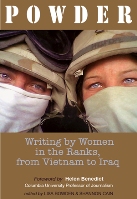All Faculty Excerpts
Powder: Writing by Women in the Ranks
 If you’ve taken a Gotham online class, you may have noticed that some of your classmates listed their home base as Iraq or Afghanistan. If so, they were probably U.S. soldiers. We’re proud to have these men and women in our classes and we are eager to hear what they have to say. And that eagerness is what inspired Gotham teacher Shannon Cain (and co-editor Lisa Bowden) to put together the recently released anthology Powder: Writing by Women in the Ranks, from Vietnam to Iraq.
Here is the preface by the editors:
If you’ve taken a Gotham online class, you may have noticed that some of your classmates listed their home base as Iraq or Afghanistan. If so, they were probably U.S. soldiers. We’re proud to have these men and women in our classes and we are eager to hear what they have to say. And that eagerness is what inspired Gotham teacher Shannon Cain (and co-editor Lisa Bowden) to put together the recently released anthology Powder: Writing by Women in the Ranks, from Vietnam to Iraq.
Here is the preface by the editors: ____________________________
At a writers’ conference in Georgia in the summer of 2005, an American veteran of the war in Iraq stood at the podium and read a personal essay about his time as a soldier. Overcome with emotion and using language both beautiful and stark, he told us about the mutilations he’d seen, the bloody losses, his struggle with self-hatred upon returning home, and the profound mistrust he now harbored for his commander-in-chief. The room went silent with respect for his service and horror for his pain. That day in Georgia, a thought arose: what about the women who have served? Where is their perspective? Who will publish their words? We put out a call, and the essays and poetry arrived. The writing blew our minds, broke our hearts and gave us hope. And suddenly we found ourselves putting forth a new rendering of American history. Here was writing that gave us the full scope of the military experience, including a range of ideas about what it means to be a patriot. As advocates for peace and justice, we went into the project determined to publish a book that would somehow help end the war in Iraq. In the process we found ourselves expanded, and in awe. We saw immediately the necessity of setting aside any agenda. We offer this poetry and this memoir edited but not manipulated, selected but not filtered. In so doing we amplify these voices, and we insist upon their place in a long and nuanced literature of war and peace. “The military is a group of diverse human beings like any other,” poet Bobbie Dykema Katsanis wrote to us in an email. “Some of us are politically liberal or progressive; many of us are against the war and oppose the current administration’s foreign policy. Often these voices are squelched in American public discourse.” Regardless of our contributors’ divergent views on the war and on the necessity of service, every one of them comes together on one point: it’s damn tough to be a woman in the military. Charlotte Brock, whose essay “Hymn” appears in these pages, says “why is there no national debate on the fact that women are subject to institutional discrimination in the military? Nowhere else in this country are women so blatantly prohibited from certain jobs solely on the basis of gender. The American public should know what military women have achieved.” In the science fiction movie Contact, an astronomer/astronaut played by Jodie Foster is launched into space at the invitation of a benign race of extraterrestrial beings. Wide-eyed at what she encounters, she says, “we should have sent a poet.” Indeed we must send poets and writers to places both heavenly and hellish so they can return to describe what the rest of us are incapable of seeing. When we send women to war, they bear witness in ways that men cannot. The memoirists and poets in this volume have stood wide-eyed at the border between war and peace, and in these pages they gift us with a record of what really happened there.
________________________________________________________
Reprinted by permission of Kore Press. For more information visit www.korepress.org/catalog.htm
